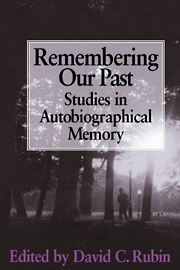Book contents
- Frontmatter
- Contents
- List of contributors
- 1 Introduction
- Part I Approaches
- Part II Accuracy
- Part III Emotions
- Part IV Social functions
- Part V Development and disruption
- 14 Remembering, recounting, and reminiscing: The development of autobiographical memory in social context
- 15 Intersecting meanings of reminiscence in adult development and aging
- 16 Schizophrenic delusions and the construction of autobiographical memory
- Subject index
- Author index
14 - Remembering, recounting, and reminiscing: The development of autobiographical memory in social context
Published online by Cambridge University Press: 14 October 2009
- Frontmatter
- Contents
- List of contributors
- 1 Introduction
- Part I Approaches
- Part II Accuracy
- Part III Emotions
- Part IV Social functions
- Part V Development and disruption
- 14 Remembering, recounting, and reminiscing: The development of autobiographical memory in social context
- 15 Intersecting meanings of reminiscence in adult development and aging
- 16 Schizophrenic delusions and the construction of autobiographical memory
- Subject index
- Author index
Summary
Recounting our past experiences is a pervasive part of social interaction. Whether we are talking with old friends or new acquaintances, speaking with faraway relatives, or simply chatting with our family around the dinner table, we talk about the past. In fact, estimates based on spontaneous conversations among families indicate that conversations about past events occur as often as five to seven times an hour (Blum-Kulka & Snow, 1992; Miller, 1994). Why is talk about the past so prevalent? Clearly, when recounting an experience to someone who was not present, the narrative has an informative function. By telling someone about the kinds of events that we have experienced, we are both telling the listener something about the kind of person we are (e.g., Brewer, 1986; Bruner, 1987; Fitzgerald, this volume; Fivush, 1988), as well as imparting important or interesting information about events in the world.
But much of social interaction focuses on recounting events with others who shared these experiences with us. This kind of joint remembering, or reminiscing, serves a very special purpose, that of creating interpersonal bonds based on a sense of shared history. In the process of recounting, interpreting, and evaluating our experiences together, we are creating a shared understanding and representation of our world and the ways in which our lives are intertwined (see also Bruner & Feldman and Hirst & Manier, this volume).
- Type
- Chapter
- Information
- Remembering our PastStudies in Autobiographical Memory, pp. 341 - 359Publisher: Cambridge University PressPrint publication year: 1996
- 74
- Cited by



